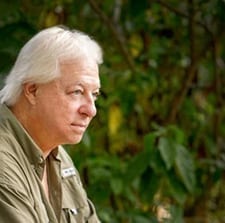Georgialina—A Southland As We Knew It
January 15, 2025By Tom Poland
In 2015, the University of South Carolina Press released my collection of memories on how things used to be. Here, then, is a trip down memory lane to the days when cutting the grass did not exist. Some of you may recall hearing your grandparents discuss this old tradition.
When People Swept Yards
Folks in South Carolina and Georgia were begging for rain. The land was dry as a bone. Lawns died and their parched roots lost their grip on the soil. Roots crawled across the ground like serpents and yards looked like the Mojave Desert—brown, dusty, and windblown.

Cover photo by Robert C. Clark
All that resurrected a memory—the days when yards were sand. Let’s return to the late 1950s. My Grandfather Walker never worried about watering his grass, cutting it, or fertilizing it. He didn’t worry about moles or keeping his lawnmower in tip-top shape. His children swept it with a broom made from a dogwood. The yard stayed clean and looked so smooth it resembled the hard-packed sand of a beach.
People use to sweep their yards and they took immense pride in having a clean yard. Some say this tradition came from West Africa where people swept yards at daybreak to keep an eye on snakes. A serpentine track in the sand betrays the presence of a snake. Swept yards served as a kind of snake radar.
Back then folks didn’t worry whether grass was centipede or Bermuda. All grasses were considered weeds. What was vital was keeping that yard clean as a whistle and the broom of choice was a dogwood branch, a “bresh broom.” Why dogwood? It lasts a long time, probably longer than many of today’s cheap plastic-component lawnmowers.
Of course things change. Most Saturday mornings you’ll hear a chorus of lawnmowers enjoying a breakfast of grass. Hearing the rhythmic sweep of dogwood branches? Well the end for that began a long time ago. And with the demise of swept yards kids’ games like marbles began to fade. Ever tried shooting marbles in grass?
Didn’t think so.
Today, having the most beautiful lawn is an obsession. We remove thatch, aerate the lawn, apply weed and feed, sharpen blades so they cut not tear, install irrigation systems, and wring our hands over the dearth of rainfall that seems to be our lot now and then.
Was a sandy yard better for the environment? Well, you had no need to water it, no fertilizer runoff, nor mowers venting exhaust fumes and for sure it made for quieter times. Not only were there no loud mowers there were no whining weed eaters and leaf blowers. Still, the fragrance of freshly mown yards is sweet, and it’s a satisfying thing to mow the yard and profitable. The first money I made came from cutting grass. Dad paid me a dime to cut the front yard. I used an old manual mower, so I earned it.
They say what goes around comes around. As I write this recollection, a gallon of regular gas is $3.85 and a barrel of oil has hit $145 for the first time. Maybe we’ll have no choice but to return to sandy yards. Or we could just paint our yards green. Yes, you can have your dead grass painted green, a practice common in professional sports arenas. I’m not ready to see dead grass painted bright green running up against a vinyl-sided house. That’s not the South I grew up in. I’ll take a swept yard over a painted yard and I’m sure my Grandfather Walker would have too.
Granddad’s house burned in 1964. It was never rebuilt. Long after it burned I went back to see the home place. No sand. No grass. Plant succession had resumed after man’s brief interruption. Pines and oaks towered over the old front yard and a broken glass and rusty enamel pot lay in tangles of vines and bushes. I suspect snakes lay about too.
Georgia native Tom Poland writes a weekly column about the South, its people, traditions, lifestyle, and culture and speaks frequently to groups in the South. Governor Henry McMaster conferred the Order of the Palmetto upon Tom, South Carolina’s highest civilian honor, stating, “His work is exceptional to the state.” Poland’s work appears in books, magazines, journals, and newspapers throughout the South.
Visit Tom’s website at www.tompoland.net
Email him at [email protected]















